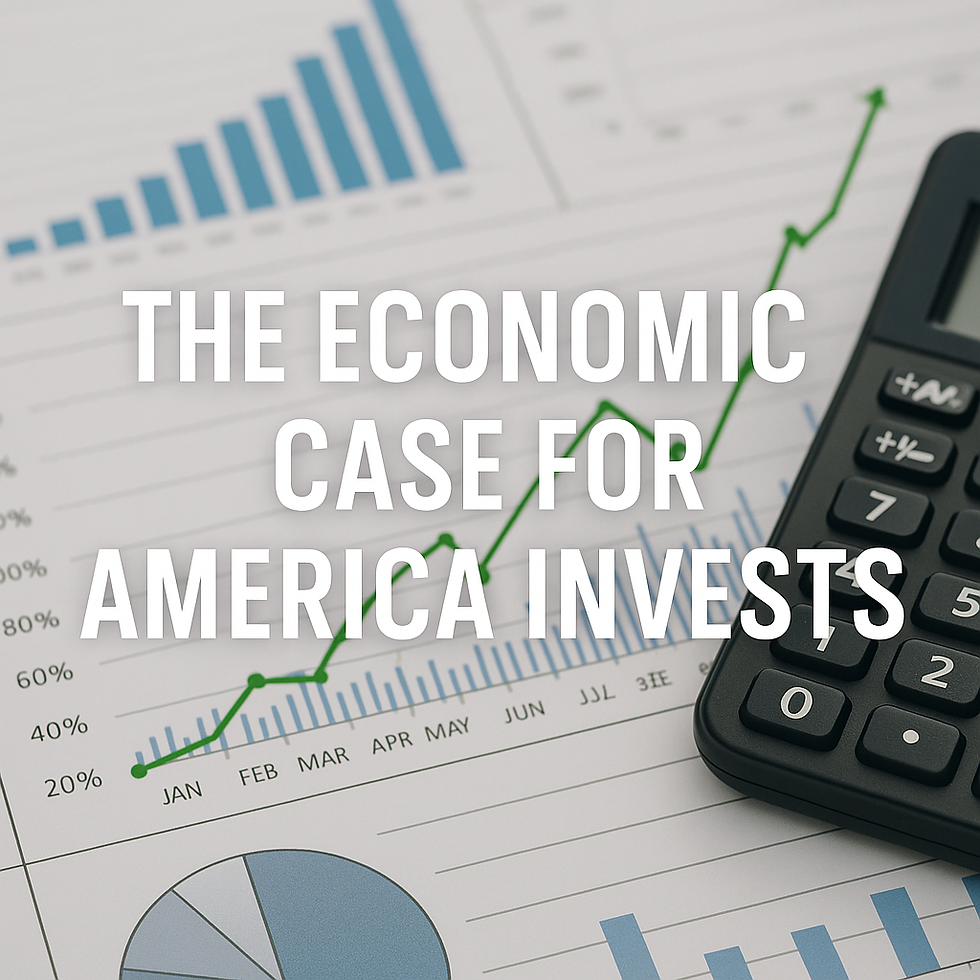Borders, Belonging, and the Balance Sheet: Immigration with America Invests
- Daniel Rowe

- Jun 25, 2025
- 3 min read

Immigration has always tested a nation’s values. It challenges what we mean by citizenship, fairness, and opportunity—and in a country with a universal basic income, those questions only grow more complex.
Imagine an America where every citizen receives a monthly share of the nation’s prosperity—not because they work, but because they belong. That’s the core promise of America Invests: a national portfolio built on shared assets, designed to grow with the economy and return dividends to the people.
But in such a system, who qualifies? When? And how do we honor both fairness and compassion—especially in the face of real concerns about sustainability and abuse?
These are serious questions. But they are not unanswerable.
The Scarcity Mindset Doesn’t Fit a Post-Scarcity System
America Invests isn’t welfare. It’s not a handout. It’s not even redistribution in the traditional sense. It’s ownership. And access to that ownership flows through citizenship—not employment.
That distinction is crucial: immigration doesn’t collapse the system, because new arrivals don’t automatically receive dividends. Instead, they follow a structured, fair pathway—just as they do for legal status and citizenship.
The goal is not to exclude, but to protect the fund’s integrity while preserving America’s long tradition of earned inclusion.
Earning Belonging: The Contribution Track
For most immigrants, access to America Invests would be gradual and earned—through legal residency, civic participation, caregiving, entrepreneurship, or time-based community presence. We call this the contribution track.
Whether an immigrant is teaching, raising a family, running a business, or volunteering in their neighborhood, their long-term engagement builds social value—even if it’s not measured in wages.
To support this pathway, America Invests could implement:
A time-based vesting system tied to lawful presence and naturalization.
Participation credits that recognize caregiving, education, community work, and residency.
Local review panels to evaluate edge cases fairly, based on community impact and public record.
This system would prevent exploitation, maintain trust, and reward long-term investment in the country.
Inclusion Without Preconditions: The Protection Track
But what about immigrants who are critically disabled or permanently dependent? What happens to people who cannot follow the standard track—through no fault of their own?
Here’s where America Invests stands apart from most economic proposals: it recognizes that dignity doesn’t have a waiting period.
For these individuals, a second pathway is essential—what we can call the protection track. This route offers inclusion based not on output, but on recognized vulnerability and lawful humanitarian presence.
The system could be structured with:
Protected Humanitarian Residency, granting legal presence and access to essential services.
A care-based citizenship pathway, for individuals requiring lifelong support.
Support for caregivers—ensuring those who provide ongoing care receive credit toward their own vesting.
This ensures that inclusion isn’t limited to the able-bodied or fortunate. It also prevents people from falling into destitution simply because they are waiting for paperwork to catch up with reality.
Guardrails Against Political Manipulation
To function fairly, America Invests must be insulated from shifting political winds. That means:
Independent governance, not partisan administration.
Statutory eligibility for both contribution and protection tracks.
Transparency tools, so the public can monitor who is qualifying and why.
If we leave these decisions to political discretion alone, we risk creating a system that excludes by delay or denies by neglect. Instead, America Invests should affirm that belonging is defined by structure—not sentiment.
A System That Reflects Who We Are
In the end, immigration is not a loophole in America Invests. It is a test of its character.
We cannot promise shared national prosperity if we refuse to recognize all the ways people participate—through labor, through care, through presence, or simply by surviving what others could not.
By building a system that offers two honest tracks to inclusion—one earned, one protected—we affirm both accountability and mercy. We build a nation that knows the difference between a handout and a hand extended.
Done right, immigration won’t threaten a UBI system. It will help it thrive—bringing in new citizens, new families, and new trust in a country where everyone has a place, and no one is forgotten.




Comments